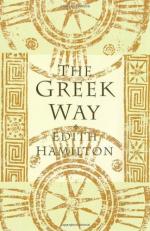
|
| Name: _________________________ | Period: ___________________ |
This test consists of 15 multiple choice questions and 5 short answer questions.
Multiple Choice Questions
1. Viewing things as part of the whole applies to all but _______________.
(a) buildings
(b) actors
(c) art
(d) wars
2. Sophocles felt that honor of men was expressed by their ______________.
(a) deeds
(b) way of life
(c) words
(d) speech
3. What characterizes the tragedies of Aeschylus?
(a) bitterness
(b) hatred
(c) passive acceptance
(d) anger
4. What terms would not apply to Xenophon?
(a) intelligent
(b) devious
(c) honest
(d) kind
5. Thucydides wrote a history of the war between ______________________.
(a) Sparta and Thebes
(b) Athens and Sparta
(c) Thebes and Peloponnesia
(d) Athens and Rome
6. Which term does not apply to the Theater of Dionysus?
(a) community
(b) worship
(c) orgies
(d) loss of the sense of isolation
7. Compared to the other tragedians, Euripides is described as the _________________.
(a) most fatal
(b) saddest
(c) happiest
(d) most tragic
8. To the Greek thinkers, religion was ______________________.
(a) tyrannical
(b) engorced by priests
(c) a search for the truth
(d) accepted by all as a necessary evil
9. Xenophon because wealthy by __________________________.
(a) working
(b) from his father's estate
(c) by being a successful businessman
(d) ransoming a rich Persian noble
10. Which tragedian is considered to be the most modern?
(a) Aeschylus
(b) Sophocles
(c) Shakespeare
(d) Euripides
11. During the war, Thucydides was _______________________.
(a) a Spartan general
(b) a diplomat
(c) an Athenian general
(d) a businessman
12. As a young man, Xenophon was ________________________.
(a) sent to Athens to find a wife
(b) exiled from Sparta
(c) sent to study with Socrates
(d) sent to work in Athens
13. Of the ninety plays that Aeschylus wrote, how many have survived?
(a) seven
(b) five
(c) twenty three
(d) ninety
14. Xenophon is famous for his book called __________________________________.
(a) Anbasis
(b) The History of the Peloponnesian War
(c) The Treatise on War
(d) A History of War
15. Which of the following is not a play of Sophocles?
(a) Oedipus Rex
(b) Libation-Bearers
(c) Oesipus at Colonus
(d) Electra
Short Answer Questions
1. Thucydides feels that the Athenians lost the war because they were ________________.
2. Which of the following terms applies to the religion of the ancient Greeks?
3. Which of the following is not one of the four elements common to every tragedy?
4. What did the Greeks view as important in men?
5. According to Hamilton, tragedy is the domain of whom?
|
This section contains 358 words (approx. 2 pages at 300 words per page) |

|




